Daniel Elsner | January 26, 2021
View PDF
Introduction
The economies, geographies, and cultures of the 54 recognized African states come together to create one of the most diverse landscapes on the planet. This diversity has led to a wide array of opportunities across the continent; it is no wonder that some of the largest companies from across the globe have made their presence known in Africa, these companies include Kellogg, Cargill, Coca-Cola, Google, Mitsui, Microsoft, and Volkswagen among many others. The goal of this paper is three-fold: to provide an overview of broad, continent-wide growth trends; to discuss the top-level business environment in Africa; and to analyze where companies can find long-term opportunities to capitalize on these trends. On the African continent, there are three countries, that in my opinion, provide some of the best prospective opportunities: Nigeria, Kenya, and Rwanda (see Figure 1 for map).
Background
Africa has a bigger area than the continental United States, Europe, India, and China combined (see Figure 2 for graphic).1 The continent is home to over 1.2 billion people and over 400 companies with revenues over $1 billion in 2017.2 The population of Africa is expected to double to over 2.4 billion people by 2050 with an estimated 89 cities growing to a population of over 1 million people by 2030.3 An estimated 80% of this growth is expected to occur in cities(see Figure 3). 4 However, most of the infrastructure needed to support this urbanization has yet to be built. Africa trailed BRIC countries (Brazil, China, India, Russia) in electricity consumption, railways, and paved roadways by 4.1x, 1.5x, and 5x respectively in 2017.5 The African Development Bank estimates there will need to be hundreds of billions of dollars of annual investment to support infrastructure, construction, transportation, electricity, water treatment, and many other areas to facilitate this continent-wide urbanization trend.6 China has taken up the role of building Africa’s infrastructure. In 2019 China built 31% and funded 20.4% of all infrastructure projects in Africa.7
The African consumer is already a formidable force with estimated annual private consumption of $1.4 trillion in 2015. Private consumption is expected to grow to $2.1 trillion by 2025.8 Discretionary income is also on the rise as 70% of African households are expected to have discretionary income by 2025, with a quarter of those households being global consumers.9 Business consumption is also on the rise and is expected to reach $3.5 trillion annually by 2025.10 Agriculture plays a huge role in Africa, roughly 60% of people in sub-Saharan Africa work or run small farms with agriculture contributing to 23% of the region’s gross domestic product (GDP).11 While Africa has enough arable land to feed itself, the continent imports much of its food supply.12,13 It is estimated that the continent could more than double its crop production by increasing farmer yields and post-harvest loss reduction. For example, African farmers lag American farmers in terms of corn yield per hectare by nearly 7 to 1.14,15 Africa is also home to vast natural resources ranging from gold, iron ore, coal, oil, natural gas, diamonds, uranium, platinum, cobalt, and many more. 16
Africa has a bubbling start-up scene that is creating innovations that are rapidly meeting the needs of the quickly changing continent. From Lagos in Nigeria to Kigali in Rwanda to Nairobi in Kenya, the tech scene is exploding with growth. Venture capital firms across the world have taken notice and have shifted resources to Africa, and over $2 billion was invested into African tech startups in 2019.17 Africa is the world’s leader in mobile money and is home to 181 million active mobile money users who transacted $456 billion in 2019.18,19 Mara Group is a prime example of African entrepreneurship. Mara Group was founded in Rwanda in 1996 and since then has created Africa’s first domestically manufactured smartphone along with a slew of other technology products. Mara employs over 11,000 people with operations and investments in 25 countries across the continent.20,21 Africa is full of budding entrepreneurs; their drive and innovation will accelerate Africa’s transformative growth and they should not be overlooked.
With all opportunities there are risks, and it is no different when investing in Africa. Finding workers with formal education or trade training has been a hurdle for many companies looking to enter the market.22 While Africa is full of ambitious and entrepreneurial young people, only 8% of students were enrolled in vocational programs and 12% of students were enrolled in tertiary programs in 2017.23 This has led to a skilled labor shortage across the continent. However, several solutions are being utilized to fix this disparity. Many firms run internal vocational training programs to develop upcoming talent.24 There are also a growing number of companies that run professional training programs that prepare African workers for corporate and business success. One such company is Generation Kenya. The talent in Africa is abundant, but companies will need to get creative and look beyond a traditional college degree to find and nurture Africa’s talent.25
Trade barriers remain a roadblock for intracontinental trade across Africa. Exports between African countries as a share of the continent’s total exports was 17% in 2017. However, in 2017, this number was 68% for Europe and 59% for Asia.26 The opportunity to increase intra-African trade is huge and the African Continental Free Trade Agreement (AfCFTA) is looking to fill this gap. Phase one of the AfCFTA, which focuses on trade barriers, took effect on January 1st, 2021. Phase two, which focuses on capital and intellectual property, is still being negotiated.27 The goal of the AfCFTA is to create a single African market, reduce tariffs by 90%, and facilitate the movement of people and capital across the continent among other objectives. Currently, 36 out of the 54 recognized member countries have ratified the agreement including the continent's largest country of Nigeria.28,29 The AfCFTA is a part of the African Union’s Agenda 2063 which aims to create pan-African financial institutions, railways, and education systems alongside other objectives by 2063.30 (See Figure 3 for a snapshot of Sub – Saharan Africa.)
Analysis
Kenya is a large country and economy within Africa and is considered the hub of East Africa.31 East Africa is a community of six states and 180 million people.32 I think that East Africa has great potential for future international trade and foreign direct investment (FDI). This is due to the region’s access to the Indian Ocean which makes it the perfect place for firms to set up manufacturing operations that ship goods to the Middle East and Asia from Africa. The Kenyan cities of Nairobi and Mombasa serve as financial and manufacturing hubs for the region. Nairobi is home to the biggest tech hub in East Africa.33 M-Pesa is the continent's leader in digital payments, and its parent company of Safaricom calls Nairobi home.34,35 Kenya attracted over $1.3 billion in FDI in 2019 and continues to attract heavy investment inflows.36 Kenya is also heavily investing in infrastructure. Two of the country’s largest projects are the Nairobi – Mombasa Highway Expansion Project and the Kenya-Uganda-Rwanda-South Sudan Rail Project.37 The Kenyan government has put in place heavy FDI incentives in the form of special economic zones (SEZ). 38 There are eight different types of SEZs ranging from livestock to freeport zones. These zones offer many incentives including a 10% ten-year corporate tax rate and duty exemptions for foreign companies that invest in Kenya.39
Many large economies have expressed interest in Kenya’s development. The UK and Kenya agreed to a trade deal in November 2020 while the US is in the early stages of negotiations.40,41 China also has a bilateral trade deal with Kenya.42 The US trade deal aims at eliminating tariffs on a slew of products and to create the environment necessary to increase mutually beneficial and fair trade of both goods and services between the two countries. This includes goals to protect intellectual property rights, create an investing environment that aligns with established US practices, and to establish environmental and anti-corruption practices in line with those in the US.43 The US is hoping to use the trade deal as a model for future deals across the continent.44 Kenya is considered a hybrid-regime by the Democracy Index. Hybrid regimes are “nations with regular electoral frauds, preventing them from being fair and free democracies. These nations commonly have governments that apply pressure on political opposition, non-independent judiciaries, widespread corruption, harassment and pressure placed on the media, anemic rule of law, and more pronounced faults than flawed democracies in the realms of underdeveloped political culture, low levels of participation in politics, and issues in the functioning of governance.” 45 Kenya also has human rights challenges such as freedom of the press and police brutality.46 Like many emerging markets, issues like those mentioned and corruption can pose a risk for investment. Due to Kenya’s potential to become a major manufacturing, financial, and tech hub within Africa, I believe that the benefits outweigh the risks for firms that are less risk adverse and that are able to do their due diligence and abide by ethical business practices. (For a snapshot of Kenya see Figure 4.)
Since the horrors of the Rwandan Genocide in 1994, Rwanda has become one of the most politically stable and fastest-growing countries on the continent. Rwandan leaders understand the importance of infrastructure development and the country is investing heavily in fiber optics, railways, roadways, and the energy sector with the goal of providing universal access to energy by 2024.47,48 Rwanda is one of the few countries in Africa to have a national 4G wireless network.49 Kigali, dubbed the “innovation city”, is the capital city of Rwanda. Kigali has an estimated 1.1 million people and is home to a bustling start-up and manufacturing scene.50,51,52 The government encourages investment across major sectors such as financial services, manufacturing, and information and communications technology (ICT) by offering many tax, labor, and other incentives.53 As a small country without ocean access, I see Rwanda serving as a future financial and business hub of Africa much like Singapore is to Asia. Rwanda’s government has even expressed its goal of becoming a Singapore-like country in Africa.54 The country ranks 38th globally in the 2020 World Bank’s Ease of Doing Business Index55,56. As a point of comparison, the US ranks 6th, China 31st, India 63rd, and Brazil 124th.57 While Rwanda is checking the boxes in terms of infrastructure, stability, and growth, there are free speech, freedom of the press, and other human rights concerns.58 The government is considered an authoritarian regime according to the Democracy Index59. (For a snapshot of Rwanda see Figure 5.)
Nigeria plays a large role in the African continent. It is both the largest country in terms of GDP and population on the continent.60,61 Nigeria’s economy is heavily reliant on its oil reserves alongside the agriculture and services industries.62 Nigeria is the largest producer of oil on the continent and is among the largest liquified natural gas exporters.63,64 Nigeria’s largest city of Lagos is among the largest metropolitan areas in the world with an estimated population of 14.8 million people.65 It is estimated that Lagos grows by 77 people every hour.66 Not only is Lagos big, but it is also home to the biggest tech hub in Africa.67 Lagos startups have attracted billions of dollars in funding from some of the top global firms.68 Nigeria also has SEZs and offers a slew of tax and other incentives for investing in the country.69 Nigeria ranks 131st globally and 17th in sub-Saharan Africa in terms of ease of doing business.70,71 While it may be harder to navigate the business environment in Nigeria compared to its peers, the market potential in Nigeria is uncontested on the continent. In 2016 Price Waterhouse Coopers (PwC) estimated that Nigeria’s economy will grow 6.6% per year to $6.3 trillion by 2050.72 Nigeria’s societal problems include not only human rights issues, but terrorism which usually occurs in the northern part of the country.73 Nigeria, like Kenya, is considered to be a hybrid-regime.74 Nigeria’s infrastructure is lackluster by international standards, but there has been substantial progress in recent years.75,76 GE for example is partnering with the Nigerian government to develop energy infrastructure to provide 10 gigawatts of power capacity to the country.77 In my opinion, the AfCFTA will increase FDI into Nigeria as companies look to set up shop there, not only to secure access to its large domestic market, but also to use Nigeria as a launch-pad to enter and sell goods into other markets across the continent as trade barriers lessen due to the AfCFTA. Nigeria’s large economy should also benefit as tariffs and duties are eliminated across most products which should enable more trade from Nigerian companies across the continent. As the country’s economy diversifies, I see it becoming a central hub for not only Western African trade, but for the entire continent. (For a snapshot of Nigeria see Figure 6.)
Outlook
There is no doubt in my mind that by the mid-to-late 21st century, Africa will be home to some of the world's largest companies, largest economies, and some of the best growth opportunities around. In a world of declining populations and overall uncertainty, Africa is a beacon of opportunity. While Africa is full of opportunity, there are also risks such as corruption, labor abuse, terrorism, civil unrest, and human rights violations. Navigating some of these issues will be a challenge for companies, and since every country is different regarding these issues, it is critical to do boots-on-the-ground research before making any investment decisions. Companies will also need to do in-depth research on potential supply chain partners to ensure that the highest possible standards when it comes to worker safety and the environment are being met. Success is never guaranteed, but companies seriously considering investing in Africa need to be nimble, open to opportunity, and will need to be aware of the business environment they will be operating in. Many firms will need to be able to ride out short-term volatility to reap long-term gains. I believe that if global firms want to stay competitive during the latter half of the 21st century, investing in Africa will need to be a part of its plan. The market size and growth, as well as the opportunities to modernize and innovate new technologies, not only in the countries mentioned but also elsewhere on the African continent, cannot be ignored. I think the time is now to start laying the groundwork for a future in Africa. This paper provides a high-level overview of the political and economic environment in Africa. Additional research will be required to further explore specific countries or business sectors.
Appendix
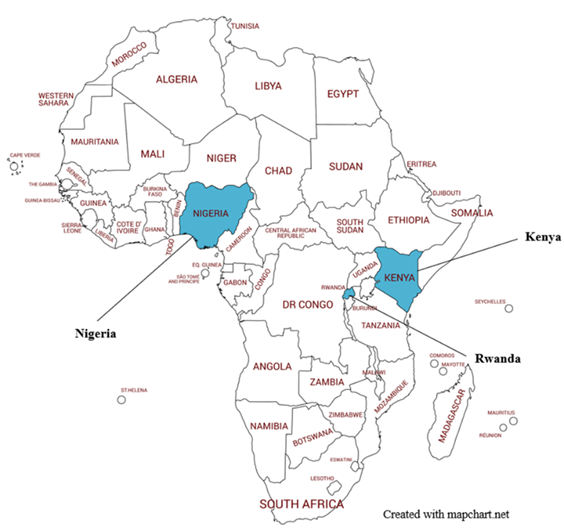
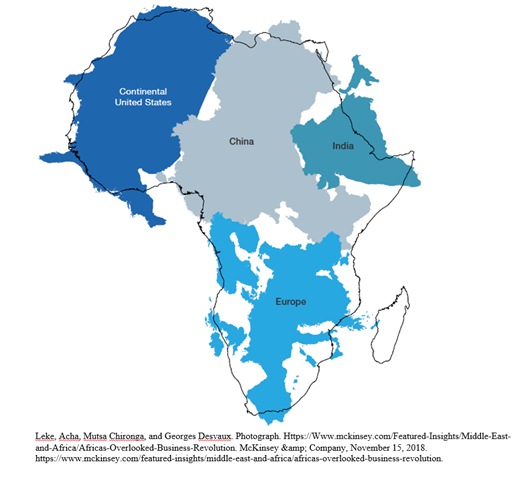
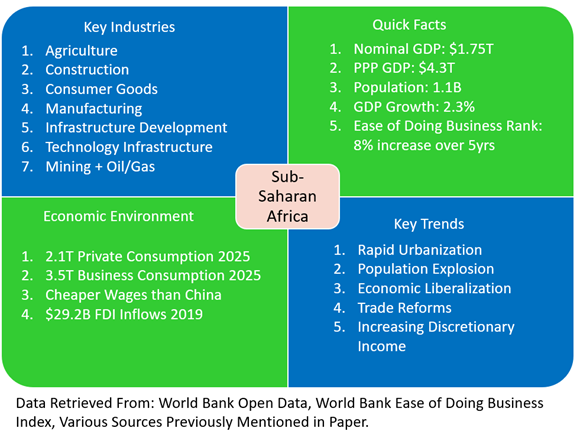
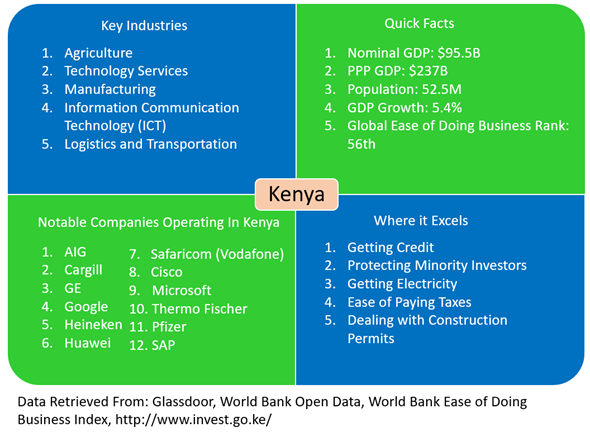
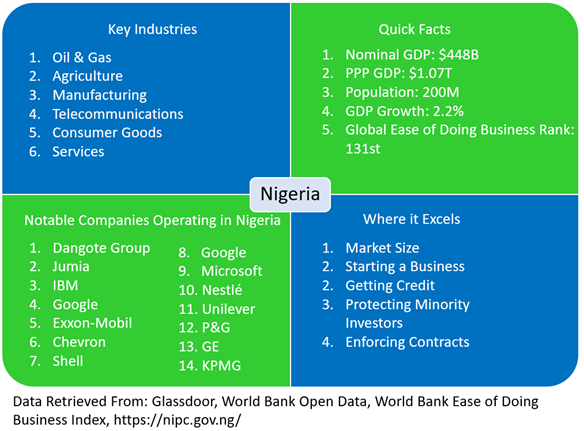
________________________________
Endnotes
1. Acha Leke, Mutsa Chironga, and Georges Desvaux, “Map Your Africa Strategy,” Africa's Business Revolution: How to Succeed in the World's next Big Growth Market, (Boston, MA: Harvard Business Review Press, 2018), 84-84.
2. Acha Leke, Mutsa Chironga, and Georges Desvaux, “A Giant Awakens,” Africa's Business Revolution: How to Succeed in the World's next Big Growth Market, (Boston, MA: Harvard Business Review Press, 2018), 10–10.
3. Acha, Chironga, and Desvaux, Africa's Business Revolution: How to Succeed in the World's next Big Growth Market, 10–10.
4. Acha Leke, Mutsa Chironga, and Georges Desvaux, “A Giant Awakens,” Africa's Business Revolution: How to Succeed in the World's next Big Growth Market, (Boston, MA: Harvard Business Review Press, 2018), 19-19.
5. Acha Leke, Mutsa Chironga, and Georges Desvaux, “The Big Five,” Africa's Business Revolution: How to Succeed in the World's next Big Growth Market, (Boston, MA: Harvard Business Review Press, 2018), 58–60.
6. “Africa's Economic Outlook 2018,” African Development Bank, accessed November 8, 2020. https://www.afdb.org/en/news-keywords/african-economic-outlook-2018.
7. Hannah Edinger, Nhlanhla Ngulube, and Masego Ntsoane, “Africa Construction Trends 2019,” Deloitte, Accessed 2020, https://www2.deloitte.com/za/en/pages/energy-and-resources/articles/africa-construction-trends.html.
8. Acha Leke, Mutsa Chironga, and Georges Desvaux, “The Big Five,” Africa's Business Revolution: How to Succeed in the World's next Big Growth Market, (Boston, MA: Harvard Business Review Press, 2018), 44-44.
9. Acha Leke, Mutsa Chironga, and Georges Desvaux, “The Big Five,” Africa's Business Revolution: How to Succeed in the World's next Big Growth Market, (Boston, MA: Harvard Business Review Press, 2018), 46-46.
10. Leke, Chironga, and Desvaux, “Africa's Business Revolution: How to Succeed in the World's next Big Growth Market.” 46–46.
11. Lutz Goedde, Amandla Ooko-Ombaka, and Gillian Pais. “Winning in Africa's Agricultural Market,” McKinsey & Company, March 20, 2019, https://www.mckinsey.com/industries/agriculture/our-insights/winning-in-africas-agricultural-market.
12. Goedde, Ooko-Ombaka, and Pais, “Winning in Africa's Agricultural Market.”
13. Abdur Rahman Alfa Shaban. “Why Is Africa Importing $35bn in Food Annually? - AfDB Boss Asks,” Africanews, April 21, 2017, https://www.africanews.com/2017/04/21/why-is-africa-importing-35bn-in-food-annually-afdb-boss-asks/.
14. Goedde, Ooko-Ombaka, Pais. “Winning in Africa's Agricultural Market.”
15. Joseph Opoku Gakpo, “5 Practical Steps African Governments Should Take to Keep Food Systems Intact When the next Pandemic Hits,” MyJoyOnline.com, October 30, 2020, https://www.myjoyonline.com/opinion/joseph-o-gakpo-5-practical-steps-african-governments-should-take-to-keep-food-systems-intact-when-the-next-pandemic-hits/.
16. “Natural Resources in Africa,” Mining Africa, accessed November 8, 2020, https://www.miningafrica.net/natural-resources-in-africa/.
17. Jake Bright, “These Specialized Africa VC Funds Are Welcoming Co-Investors,” TechCrunch, February 20, 2020, https://techcrunch.com/2020/02/19/these-specialized-africa-vc-funds-are-welcoming-co-investors/.
18. Mutsa Chironga, Hilary De Grandis, and Yassir Zouaoui, “Mobile Financial Services in Africa: Winning the Battle for the Customer,” McKinsey & Company, February 20, 2018, https://www.mckinsey.com/industries/financial-services/our-insights/mobile-financial-services-in-africa-winning-the-battle-for-the-customer.
19. Quentin Vellue, “Africa: over 500 Million Mobile-Money Users Expected in 2020,” The Africa Report, April 8, 2020, https://www.theafricareport.com/25846/africa-over-500-million-mobile-money-users-expected-in-2020/.
20. “Mara Corporation,” Mara Phones, accessed November 8, 2020, https://maraphones.com/mara-corporation/.
21. Courtney Trenwith, “The Lion's Roar: Ashish J Thakkar's Rise from Rwanda Genocide to $1bn Powerhouse,” Arabian Business, December 12, 2014, https://www.arabianbusiness.com/the-lion-s-roar-ashish-j-thakkar-s-rise-from-rwanda-genocide--1bn-powerhouse-574819.html.
22. Acha Leke, Mutsa Chironga, and Georges Desvaux, “Unleash Africa’s Talent,” Africa's Business Revolution: How to Succeed in the World's next Big Growth Market, (Boston, MA: Harvard Business Review Press, 2018.
23. Acha Leke, Mutsa Chironga, and Georges Desvaux, “Unleash Africa’s Talent,” Africa's Business Revolution: How to Succeed in the World's next Big Growth Market, (Boston, MA: Harvard Business Review Press, 2018), 162-163.
24. Acha Leke, Mutsa Chironga, and Georges Desvaux, “Unleash Africa’s Talent,” Africa's Business Revolution: How to Succeed in the World's next Big Growth Market, (Boston, MA: Harvard Business Review Press, 2018), 168-168.
25. Acha Leke, Mutsa Chironga, and Georges Desvaux, “Unleash Africa's Talent: Imagining New Approaches To Shape The Skills Of The Future,” Africa.com, March 11, 2020, https://africa.com/unleash-africas-talent-imagining-new-approaches-to-shape-the-skills-of-the-future/.
26. “Economic Development in Africa Report 2019” United Nations Conference on Trade and Development, June 26, 2019, https://unctad.org/press-material/facts-figures-0.
27. “African Continental Free Trade Area (AfCFTA)”, The Africa-EU Partnership. Accessed November 8, 2020, https://africa-eu-partnership.org/en/afcfta.
28. “Nigeria Ratifies Its Membership of AfCFTA,” China Global Television network, November 11, 2020, https://newsaf.cgtn.com/news/2020-11-12/Nigeria-ratifies-its-membership-of-AfCFTA-VlhJin1CZW/index.html.
29. “African Continental Free Trade Area,” Wikipedia, December 3, 2020, https://en.wikipedia.org/w/index.php?title=African_Continental_Free_Trade_Area&oldid=992070252.
30. “Flagship Projects of Agenda 2063,” African Union, February 10, 2020, https://au.int/agenda2063/flagship-projects.
31. Nieuwsbericht, “Kenya Is the Logistical Hub of East Africa,” Ministerie van Landbouw, Natuur en Voedselkwaliteit, October 27, 2020, https://www.agroberichtenbuitenland.nl/actueel/nieuws/2020/10/27/kenya-is-the-logistical-hub-of-east-africa.
32. “East African Community,” Wikipedia, October 17, 2020, https://en.wikipedia.org/wiki/East_African_Community.
33. “State of the Africa's Tech Hubs Ecosystems,” AfriLabs and Briter Bridges, October 2019, https://briterbridges.com/s/40_AFRILABS_REPORT-FINAL-compressed-9yhj.pdf.
34. “M-Pesa,” Vodafone, accessed November 9, 2020, https://www.vodafone.com/what-we-do/services/m-pesa.
35. “Safaricom Kenya Contacts and Headquarter Location,” Venas News, December 13, 2016, https://venasnews.com/safaricom-kenya-contacts-headquarter-location/.
36. “Foreign Direct Investment (FDI) in Kenya,” Nordea Trade Portal, accessed November 9, 2020, https://www.nordeatrade.com/se/explore-new-market/kenya/investment.
37. Edinger, Ngulube, and Ntsoane, “Africa Construction Trends 2019.”
38. “Special Economic Zones in Kenya,” Kenya Institute of Planners, accessed December 28, 2020, https://www.kip.or.ke/wp-content/uploads/2018/10/1_ICPBF_MoITC_Special-Economic-Zones_Robinah-Mwenesi.pdf.
39. Kenya Institute of Planners, “Special Economic Zones in Kenya.”
40. Jack Caporal, John Hoffner, and Sanvid Tuljapurkar, “Going Solo: What Is the Significance of a U.S.-Kenya Free Trade Agreement?” Center for Strategic and International Studies, October 2, 2020, https://www.csis.org/analysis/going-solo-what-significance-us-kenya-free-trade-agreement.
41. Aggrey Mutambo, “Kenya: Govt to Sign Trade Deal With UK After London Lifts Lockdown,” All Africa, November 16, 2020, https://allafrica.com/stories/202011160167.html.
42. “Kenya – Trade Agreements,” International Trade Administration, August 13, 2019, https://www.export.gov/apex/article2?id=Kenya-trade-agreements.
43. “United States – Kenya Negotiations: Summary of Specific Negotiating Objectives,” Office of the United States Trade Representative, May 2020, https://ustr.gov/sites/default/files/Summary_of_U.S.-Kenya_Negotiating_Objectives.pdf
44. Caporal, Hoffner, Tuliapurkar, “Going Solo: What Is the Significance of a U.S.-Kenya Free Trade Agreement?”
45. “Democracy Index,” Wikipedia, September 24, 2020, https://en.wikipedia.org/wiki/Democracy_Index.
46. “World Report 2020: Rights Trends in Kenya,” Human Rights Watch, January 14, 2020, https://www.hrw.org/world-report/2020/country-chapters/kenya.
47. “Infrastructure,” Visit Rwanda, accessed November 9, 2020, https://www.visitrwanda.com/investment-opportunities/infrastructure/.
48 - “Rwanda - Market Opportunities,” International Trade Administration, September 21, 2020, https://www.trade.gov/country-commercial-guides/rwanda-market-opportunities.
49. International Trade Administration, “Rwanda - Market Opportunities.”
50. International Trade Administration, “Rwanda - Market Opportunities.”
51. “Kigali, Rwanda Population,” World Population Statistics, accessed November 9, 2020, https://populationstat.com/rwanda/kigali.
52. Matt Davis, “Is Rwanda in Line to Become One of Africa's Major Tech Hubs?” Big Think, October 18, 2019, https://bigthink.com/technology-innovation/rwanda-tech-hub?rebelltitem=1.
53. “Why Invest,” Visit Rwanda, https://www.visitrwanda.com/investment/why-invest/?o=tab-2.
54. Mary Kay Magistad, “Rwanda Aspires to Become the 'Singapore of Africa',” The World, November 16, 2011, https://www.pri.org/stories/2011-11-16/rwanda-aspires-become-singapore-africa.
55. “Doing Business 2020 - Sub - Saharan Africa,” World Bank Group, October 24, 2019, https://www.doingbusiness.org/content/dam/doingBusiness/media/Profiles/Regional/DB2020/SSA.pdf.
56. “Doing Business 2020 – Rwanda,” World Bank Group, October 24, 2019, https://www.doingbusiness.org/content/dam/doingBusiness/country/r/rwanda/RWA.pdf.
57. “Ease of Doing Business Rankings,” October 24, 2019, https://www.doingbusiness.org/en/rankings.
58. “World Report 2020: Rights Trends in Rwanda,” Human Rights Watch, January 14, 2020, https://www.hrw.org/world-report/2020/country-chapters/rwanda.
59. “Democracy Index,” Wikipedia, September 24, 2020, https://en.wikipedia.org/wiki/Democracy_Index.
60. “Africa Population 2020,” World Population Review, accessed November 17, 2020, https://worldpopulationreview.com/continents/africa-population.
61. Simona Varrella, “Africa: GDP, by Country 2019,” Statista, September 7, 2020, https://www.statista.com/statistics/1120999/gdp-of-african-countries-by-country/.
62. “The World Factbook: Nigeria,” Central Intelligence Agency, February 1, 2018, https://www.cia.gov/library/publications/the-world-factbook/geos/ni.html.
63. “Exporting to Nigeria - Market Overview,” International Trade Administration, October 13, 2019, https://www.trade.gov/knowledge-product/exporting-nigeria-market-overview.
64. “Oil Production by Country,” Worldometer, accessed December 7, 2020, https://www.worldometers.info/oil/oil-production-by-country/.
65. “Lagos, Nigeria Metro Area Population 1950-2021,” MacroTrends, accessed January 23, 2021. https://www.macrotrends.net/cities/22007/lagos/population.
66. Acha Leke, Mutsa Chironga, and Georges Desvaux, “Map Your Africa Strategy,” Africa's Business Revolution: How to Succeed in the World's next Big Growth Market, (Boston, MA: Harvard Business Review Press, 2018), 98–98.
67. AfriLabs, and Britter Bridges, Rep. State of the Africa's Tech Hubs Ecosystems, October 2019. https://briterbridges.com/s/40_AFRILABS_REPORT-FINAL-compressed-9yhj.pdf.
68. “Lagos Companies,” accessed January 5, 2021, https://www.crunchbase.com/hub/lagos-companies.
69. Simona Varrella, “Africa: GDP, by Country 2019.” Statista, September 7, 2020, https://www.statista.com/statistics/1120999/gdp-of-african-countries-by-country/.
70. “Doing Business 2020 - Sub-Saharan Africa,” World Bank Group, October 24, 2019, https://www.doingbusiness.org/content/dam/doingBusiness/media/Profiles/Regional/DB2020/SSA.pdf.
71. “Doing Business 2020 – Nigeria,” World Bank Group, October 24, 2019, https://www.doingbusiness.org/content/dam/doingBusiness/country/n/nigeria/NGA.pdf.
72. “Nigeria: Looking Beyond Oil,” PwC, March 2016, https://www.pwc.com/ng/en/assets/pdf/nigeria-looking-beyond-oil-report.pdf.
73. “World Report 2020: Rights Trends in Nigeria,” Human Rights Watch, January 15, 2020, https://www.hrw.org/world-report/2020/country-chapters/nigeria.
74. “Democracy Index,” Wikipedia.
75. Acha Leke, Mutsa Chironga, and Georges Desvaux, “The Big Five,” Africa's Business Revolution: How to Succeed in the World's next Big Growth Market, (Boston, MA: Harvard Business Review Press, 2018), 43-43.
76. Acha Leke, Mutsa Chironga, and Georges Desvaux, “Innovate Your Business Model,” Africa's Business Revolution: How to Succeed in the World's next Big Growth Market, (Boston, MA: Harvard Business Review Press, 2018), 116-117.
77. “Nigeria,” General Electric, October 9, 2019, https://www.ge.com/africa/content/nigeria.

About Daniel Elsner
Daniel is a junior from Plymouth, Minnesota majoring in supply chain management with minors in agribusiness and global leadership.